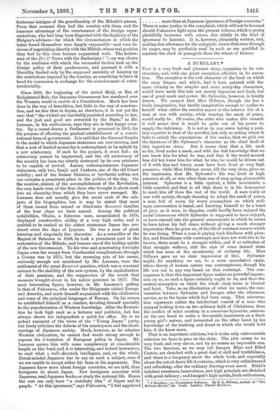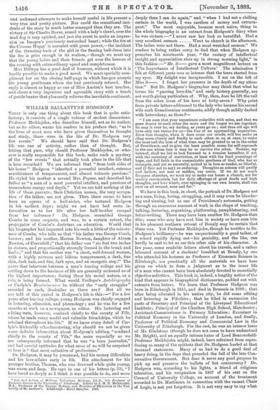A BURGLARY.*
Tim is a very fresh and pleasant story, ingenious iu its con- struction, and, with one great exception, effective in its execu- tion. The exception is the evil character of the book on which the story hinges, and which, had it been painted with the same vivacity as the simpler and more every-day characters, would have made this tale not merely ingenious and fresh, but one of great mark and power. Mr. Sylvester, however, is faintly drawn. We suspect that Miss Dillwyn, though she has a lively imagination, has hardly imagination enough to realise to herself what either the exterior aspect or the interior life of a man at war with society, while wearing the mask of peace, would really be. Of course, the critic who makes this remark is well aware that it would be quite out of his power to supply the deficiency. It is not as in any sense taking a posi- tion superior to that of the novelist, but only as noting where it fails to satisfy the expectations of the reader, that we pick out the faintness of Mr. Sylvester's character as the chief fault of this ingenious story. But it seems clear that a life such as his, lived under a mask, and with the full knowledge that no one knew him for what he was, and that if the world around him did but know him for what he was, he would be driven out of it with fear and terror, must have been lived at very high pressure; while Miss Dillwyn never, till the very close, gives us the impression that Mr. Sylvester's life was lived at high pressure at all, or was other than one of easy-going, pleasurable interest. Sylvester is a little cynical, a little inscrutable, a little scornful, and that is all that there is in his demeanour to mark him off from the rest of the world. A man really at war with society, though choosing to adopt the mask of peace, a man full of scorn for every assumption on which ordi- nary conversation is based, and knowing himself to be a beast of prey, as it were, in disguise, could hardly have enjoyed the social intercourse which Sylvester is supposed to have enjoyed, or have entered into the general amusements in which he seems to have taken his full share, without giving a much stronger impression than he gives us, of the life of constant reserve which he was living. When a man is paying back kindness with plun- der, and friendliness with contempt, and does not wish this to be known, there must be a struggle within, and if no reflection of that straggle without, still the sign of some inward state which has none of the spontaneity of ordinary life. Miss Dillwyn gave us no clear impression of this. Sylvester might, for anything we see, be a mere speculative cynic, whose theory of human nature was contemptuous, though his life was not in any way based on that contempt. The con- sequence is that this important figure makes no powerful impres- sion on us, as such a figure certainly ought to do, and thus the central conception on which the whole story turns is blurred and faint. Take, as an illustration of what we mean, the con- versation between Sylvester and Imogen after the afternoon service, as to the hymn which had been sung. That conversa- tion represents rather the intellectual conceit of a man who enjoyed looking down on the ordinary faith of Christians, than the conflict of mind existing in a conscious hypocrite, anxious on the one hand to make a favourable impression on a fresh young girl's nature, and tormented on the other band by his knowledge of the loathing and dread in which she would hold him, if she knew more.
That is an important criticism, but it is the only unfavourable criticism we have to pass on the story. The plot seems to us very fresh and very clever, and by no means an impossible one. The two heroines, as we may call Imogen Rhys and Ethel Carton, are sketched with a great deal of skill and truthfulness, and there is a buoyancy about the whole book, and especially about the ont-of doors life it contains, which is very nnhackneyed and refreshing, after the ordinary drawing-room novel. Ethel's indolent sweetness, benevolence, and high principle are sketched with great delicacy ; and Imogen's high spirits, fresh enthusiasm,
• A Burglary ; or, Unconscious Influence. By K. A. Dillwyn, Author of "The Rebecca Rioter," &o. 3 vols. London : Tinsley Brothers.
and awkward attempts to make herself useful in life present a very true and pretty picture. Nor could the sensational inci- dents of the story be much better managed than they are. The victory of Sir Charles Dover, armed with a lady's shawl, over the mad dog is very spirited, and just the event to make an impres- sion on Imogen's previously untouched heart; while the fire at the Croesus Hoggs' is narrated with great power,—the incident of the thrusting-back of the girl in the flaming ball-dress into the fire is grim enough in its realism,—though we must say that the young ladies and their friends get over the horrors of the evening with extraordinary speed and completeness.
Miss Dillwyn has a good deal of humour, without which it is hardly possible to make a good novel. We must specially com- pliment her on the closing half-page in which Imogen accepts the young gentleman whom she had previously refused. Her reply is almost as happy as one of Miss Ansten's best touches, and closes a very ingenious and agreeable story with a touch of gentle banter that pleasantly relieves the inevitable sentiment.







































 Previous page
Previous page